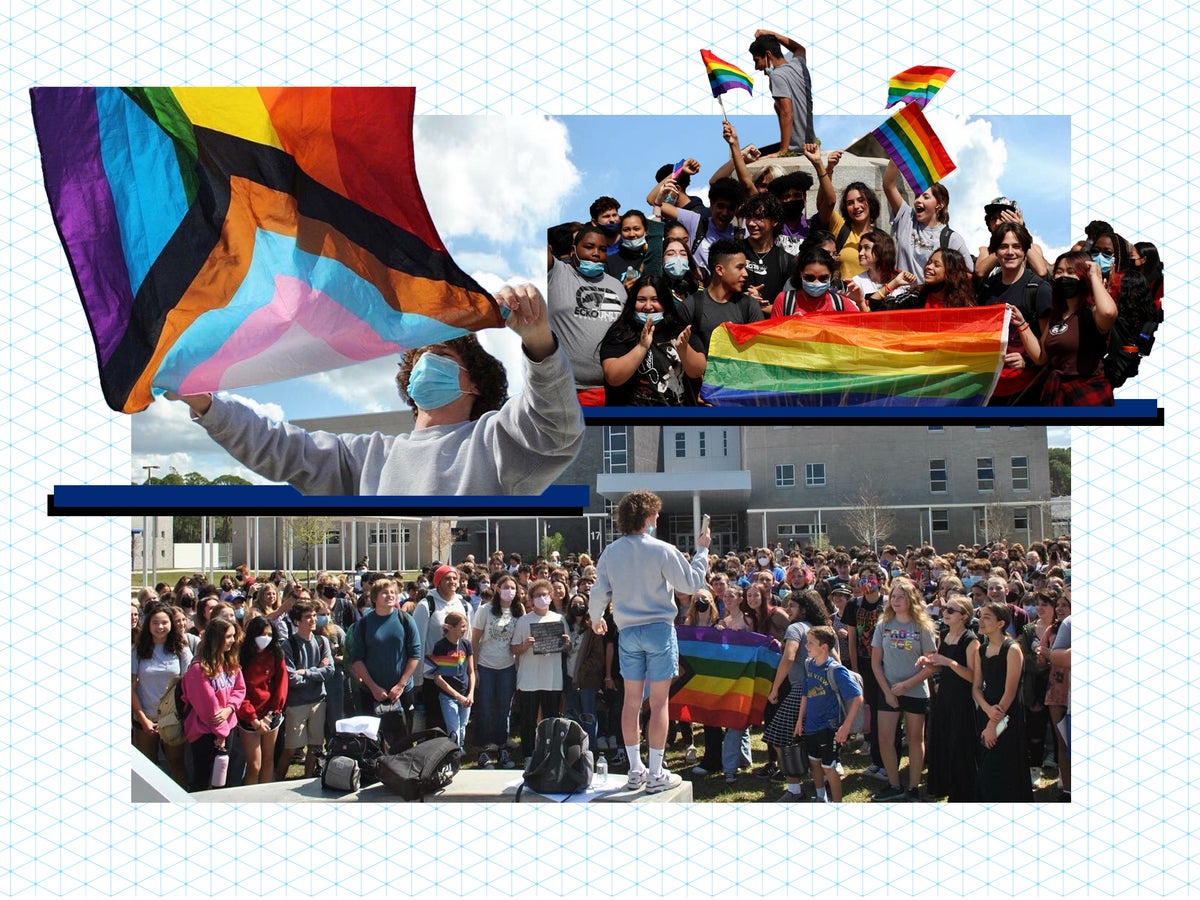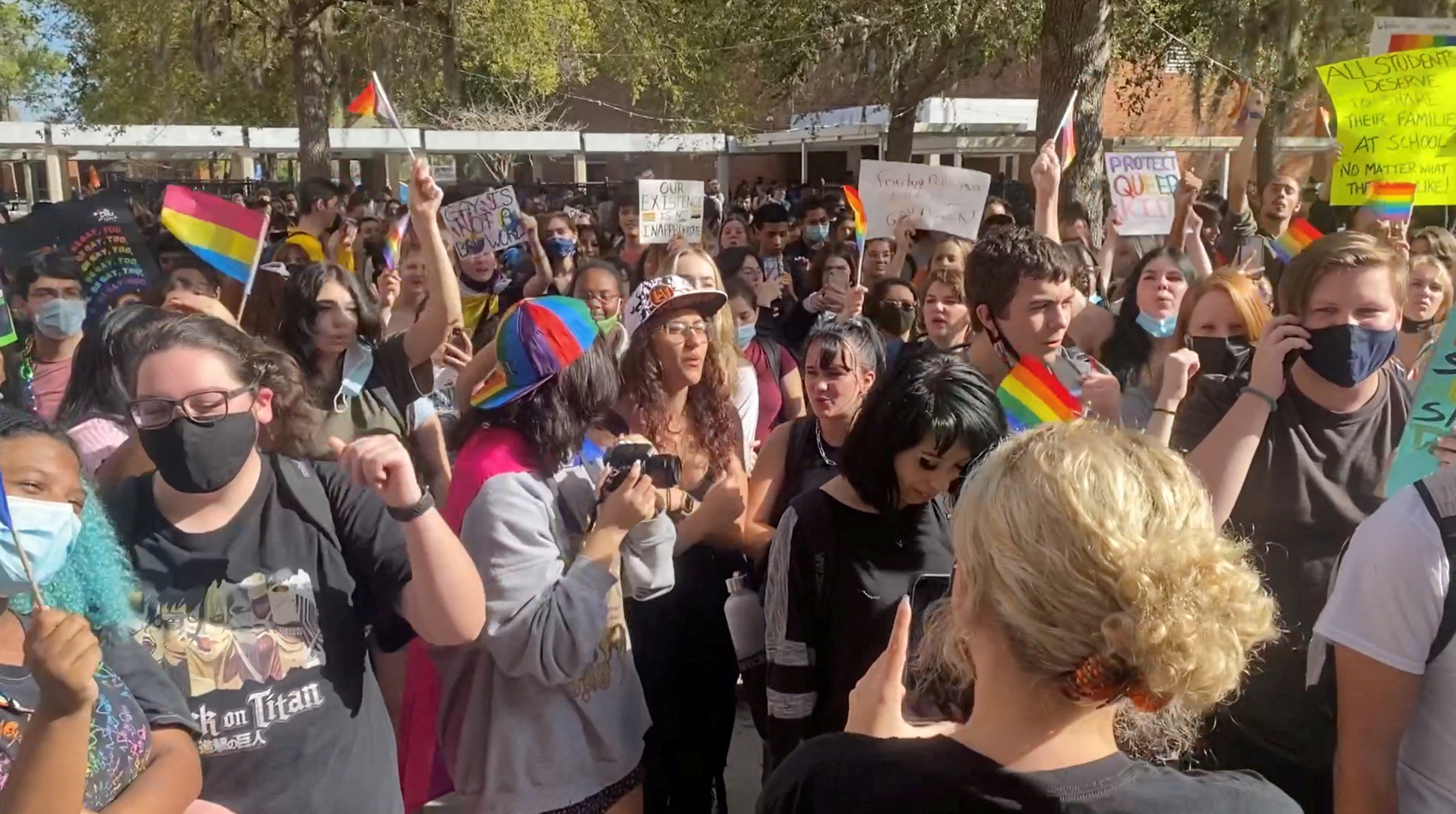
Zander Moricz’s last week of high school was among “the most miserable, terrifying and upsetting” weeks of his life, leading up to a graduation speech that felt like a “permanent stomachache” to prepare for.
The first openly gay class president of Pine View High School in Osprey, Florida said he was warned by school administrators against discussing his activism, or from even using the word “gay”, following a year in which organising other students and advocates against LGBT+ discrimination and the state’s so-called “Don’t Say Gay” law have been central to their high school experience.
Mr Moricz ultimately gave his speech without saying the word, by using his “curly hair” as a euphemism, but his remarks underscored the chilling effects of a law that opponents have warned is trying to erase students like him from their schools.
“I spent morning and night embarrassed of them trying to straighten this part of who I am, but the daily damage of trying to fix myself became too much to endure,” he said in his commencement speech last month. “So while having curly hair in Florida is difficult due to the ‘humidity’, I decided to be proud of who I was and started coming to school as my authentic self.”
“My high school career has been a fight,” he told The Independent after his speech. “I chose for it to be, and I don’t regret that it was, but it was a four-year fight.”
It was not the first time he faced scrutiny or threats from administrators for his activism; when he organised a campus walkout to protest the “Parental Rights in Education” bill – what opponents have called “Don’t Say Gay” – staff ripped signs promoting the demonstration from the school’s walls and told him to shut it down, he said.
“They said they would send school security if I did not listen,” he said at the time. “I held the walkout anyways, and it became our county’s largest protest. I won’t give in to threats and I won’t be silenced.”
Florida’s so-called “Don’t Say Gay” law bans “classroom instruction” on sexual orientation and gender identity, what opponents fear will censor how students learn about LGBT+ people, history and events, or their families, or themselves, and how questions from students about any of those issues can be answered without potential lawsuits over perceived violations.
According to advocates like Mr Moricz, the law’s adoption – six years after Florida’s Pulse Nightclub massacre, the deadliest attack against LGBT+ people in American history – reflects the state’s failure to protect LGBT+ young people while also undermining their safety in the places where they spend most of their years.
A new generation of young LGBT+ advocates in Florida and across the US is now navigating hostile school administrations and state legislatures while fighting for their peers and the safe spaces they have created.
In his sophomore year, Mr Moricz created the Social Equity and Education Initiative, which started as a student club on campus before it became a national organisation after it “snowballed rapidly” with petition campaigns, speaking out at school board meetings, drafting recommendations for policy reform and voter registration drives.
He also is the youngest plaintiff in a federal lawsuit challenging the law, alleging that the law is an “unlawful attempt to stigmatize, silence, and erase LGBTQ people in Florida’s public schools”.
“I want to make sure people understand this is not just about Florida and Don’t Say Gay laws,” Mr Moricz told The Independent. “What people who aren’t necessarily students may not see and need to understand … is that the point of this legislation is to take the only space that all children are guaranteed access to and make it hostile for certain groups of students, so that those students have to choose either, ‘I am not going to come out’ or ‘I’m going to come out in an environment that is no longer safe.’ The choice is danger or nothing. And so what you’re going to have is children who choose nothing.”
The Independent has requested comment from the Sarasota County Schools system.

The first LGBT+ student rights group in the US likely came from a high school in the Bronx in the early 1970s, in the aftermath of New York City’s Stonewall uprisings; students wrote in a pamphlet with their demands that “the present imbalance of student civil rights is political” and “to end this discriminating abuse, political organising becomes mandatory”.
“We hold our future in our own hands … to be respected as any other human being, and walk and live proudly in the communities where we work and play,” the pamphlet reads, echoing statements from generations of activists in the years that followed.
Decades later, Republican legislators in several states have proposed “Don’t Say Gay” measures like the one signed into law by Florida Governor Ron DeSantis, joining an unprecedented campaign of state-level bills affecting young LGBT+ people, mostly targeting classroom speech and transgender youth.
The anti-gay rhetoric in support of “Don’t Say Gay” legislation is sadly and intimately familiar to many young queer people; the latest debate has sparked a wave of on- and offline abuse characterising opposition to the GOP’s so-called “anti-grooming” agenda as “pro-paedophile” – abuse that targets LGBT+ people and is legitmised with legislation.
Two-thirds of LGBT+ youth reported negative mental health impacts around such legislation, according to a report from LGBT+ advocacy and crisis intervention group The Trevor Project.
A 2021 report from the organisation found LGBT+ youth are four times more likely to seriously consider, plan or attempt suicide than their peers, while LGBT+ young people between the ages of 13 and 24 attempt to kill themselves every 45 seconds within the US.
When Florida’s “Don’t Say Gay” bill was introduced, “everyone became more cautious, more concerned and more worried,” Mr Moricz told The Independent.
“It took a week to destroy a culture that has supported me for four or five years, but the student bodies have become galvanised, they’ve become energised, and … people are starting to become aware that this is an emergency and that we need to respond urgently, and that this is critical,” he said.
Hundreds of LGBT+ students in Florida and their allies walked out of classes and staged protests on their campuses and in the state capitol, while young organisers across the US are collaborating on social media and sharing resources and materials otherwise barred under broad “critical race theory” bans or book censorship, and building their own curriculums to combat discriminatory school policies.
Will Larkins, who founded a Queer Student Union at Florida’s Winter Park High School, helped organise a walkout with 500 students against the “Don’t Say Gay” bill, testified against the legislation at the state capitol, and wrote an op-ed for The New York Times about its threat to LGBT+ students like him.
“Florida is becoming a hostile and dangerous place for the queer community. And it already was. It’s already not the best state to be gay in, and now it’s getting worse,” he told The Independent earlier this year. “I feel like I could live my life centered around advocacy and activism for the rest of high school. … One of the main things that kept me really depressed was not having a goal. I felt like I was waiting on high school, waiting for my life to start, and now I have something to do, and it’s helpful and it helps people, which is beautiful.”
Jack Petocz, who was suspended for four days after leading protests at his school and distributing hundreds of rainbow flags, said school administrators tried to stop him from running for senior class president.
“I am continuing to be punished for standing up for my identity and against widespread hatred,” he said in a statement. “We shouldn’t be subject to abuse both in Tallahassee and at home.”
Mr Moricz, who will be studying government at Harvard University this fall, initially was inspired to organise on his campus after learning about public school funding disparities and “the idea that the amount of money that you and your family had directly correlated to the quality of education that you would receive,” he said.
“It was a perfect depiction to me that politics had overstepped what it was supposed to do. And it was not serving the people in the way that it needed to.”
The Social Equity and Education Initiative’s national campaign helps connect other Gen Z activists with resources, mentors, legal aid, “anything that we have that they need” to become a “national support system for local advocacy” as the current generation of high school student organisers leave their homes for universities across the US, Mr Moricz said.
Mr Moricz said he was reluctant to expand the campaign nationally, fearing that the group’s efforts would be diluted once its attention shifted to other states, but “it’s become critical to the point where we can’t really just ignore what’s happening beyond state borders, and we really have to focus on where we can help.”
Republican legislators in more than a dozen states filed similar “Don’t Say Gay” legislation this year, part of a coordinated campaign impacting LGBT+ young people and students of colour – from school board races dominated by right-wing activists to efforts to censor LGBT+ content and honest discussions of anti-Black racism and the history of enslavement from library materials and classroom instruction.
“Things like the ‘Don’t Say Gay’ law are not just happening in Florida and Texas anymore – they’re spreading across the country, and we feel that the response needs to spread as well, because we were too late here in Florida,” Mr Moricz told The Independent. “Now we’re duking it out in the courts, but that’s not sustainable. … We need to be really strategic in the way that we respond and need to be preemptive.”
Proponents of “Don’t Say Gay” legislation have argued that its critics have overblown its impact, or that the law only targets instruction in kindergarten through third grade, despite broad language in the bill’s text that would apply to all classrooms of any age.
Mr Moricz says many teachers and school staff want to do the right thing for their LGBT+ students, but the bill’s introduction created a “new culture of fear” – teachers now could face potential legal consequences and harassment for their work, and students were thrown under an international spotlight for abuse while advocating for themselves.
“People have got to understand that this is an entire sweeping boot on the face of the LGBT+ community,” Mr Moricz said. “It is meant to silence us, push us back into the closets. And if people think that this isn’t going to have a permanent generational impact if it goes into effect, they’re kidding themselves.”
The Independent is the official publishing partner of Pride in London 2022 and a proud sponsor of NYC Pride.







